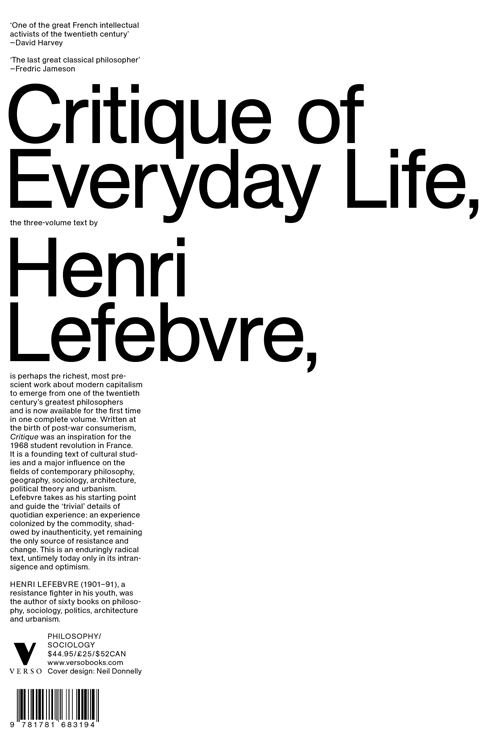Should We All Log Off? Verso Student Reading on the Politics of Digital Culture

We all live online now. What does that mean for our understanding of politics? Does going online make us more likely to think of politics as “spreading awareness” or winning online debates as opposed to gaining actual power? Or is it all just a stew of pseudo-activity that makes us feel a false sense of agency? Is there anything to be gained, or are we just padding the pockets of tech CEOs and massive media conglomerates? Should we all just log off?
The readings below help us understand how we should conceive the digital economy more broadly, both in terms of the power of private firms within the attention economy as well as what digital technology does to our minds and our capacities to work together in the real world.
The following readings all approach the question of the politics of mass culture within capitalism, from Adorno’s critique of the culture industry to Debord’s society of the spectacle to Baudrillard’s theory of a world where the distinction between the real and the image has been totally blurred. What can we learn from these past critiques to make sense of the rise and political function of digital culture today?
Until January 2, 2023 at 11:59PM EST, we have 40% off ALL books (see full details here)!
See our Gift Guide and all our reading lists, including The Year in 10 Books, Radicalize Your Niblings, Radical Happiness, Tis the Season to Abolish the Family, Understanding the Cost of Living Crisis, Christianity and Anticapitalism.
In this uncompromising essay, Jonathan Crary presents the obvious but unsayable reality: our ‘digital age’ is synonymous with the disastrous terminal stage of global capitalism and its financialisation of social existence, mass impoverishment, ecocide, and military terror. Scorched Earth surveys the wrecking of a living world by the internet complex and its devastation of communities and their capacities for mutual support.
This polemic by the author of 24/7 dismantles the presumption that social media could be an instrument of radical change and contends that the networks and platforms of transnational corporations are intrinsically incompatible with a habitable earth or with the human interdependence needed to build egalitarian post-capitalist forms of life.
No other country and no other period has produced a tradition of major aesthetic debate to compare with that which unfolded in German culture from the 1930s to the 1950s. In Aesthetics and Politics the key texts of the great Marxist controversies over literature and art during these years are assembled in a single volume.
The unwritten contract of the internet, that a user is what is used, extends from the well-examined issue of data privacy and consent to the very selves women are encouraged to create in order to appear. Invited to self-construct as 'girls online', vloggers, bloggers and influencers sign a devil's bargain: a platform on the condition they commodify themselves, eternally youthful, cute and responsibility-free, hiding offline domestic, professional and emotional labour while paying for their online presence with ‘accounts’ of personal ‘experience’. Can a Girl Online use these platforms not only to escape meatspace oppressions, but as spaces for survival, creativity and resistance?
The three-volume text by Henri Lefebvre is perhaps the richest, most prescient work about modern capitalism to emerge from one of the twentieth century's greatest philosophers, available for the first time in one complete volume. A founding text of cultural studies and a major influence on the fields of contemporary philosophy, geography, sociology, architecture, political theory and urbanism, Critique was an inspiration for the 1968 student revolution in France. This is an enduringly radical text, untimely today only in its intransigence and optimism.
The internet is broken. Google annihilates your privacy and Facebook amplifies right-wing propaganda because it is profitable to do so. But the internet wasn't always like this—it had to be remade for the purposes of profit maximization, through a years-long process of privatization that turned a small research network into a powerhouse of global capitalism. Tarnoff tells the story of the privatization that made the modern internet, and which set in motion the crises that consume it today.
The divide between the digital and the real world no longer exists. We are connected all the time. How do we find out who we are in this digital era? Where do we create the space to explore our identity? How can we come together in solidarity?
First published in 1967, Guy Debord’s stinging revolutionary critique of contemporary society, The Society of the Spectacle has since acquired a cult status. Credited by many as being the inspiration for the ideas generated by the events of May 1968 in France, Debord’s pitiless attack on commodity fetishism and its incrustation in the practices of everyday life continues to burn brightly in today's age of social media and the soundbite. In Comments on the Society of the Spectacle, published twenty years later, Debord returned to the themes of his previous analysis and demonstrated how they were all the more relevant in a period when the “integrated spectacle” was dominant.
The System of Objects is a tour de force—a theoretical letter-in-a-bottle tossed into the ocean in 1968, which brilliantly communicates to us all the live ideas of the day—offering a cultural critique of the commodity in consumer society.
This classic work from the defining intellectual of the postmodern, Jean Baudrillard, takes Marx’s critique of political economy and its analysis of the commodity form as the starting point for an analysis of signs and their meaning in modern society. Combining semiological studies and sociology of the consumer society, this is Baudrillard’s most extensive engagement with Marxism and shows him at a critical juncture for the development of his thought.
In this follow-up to the acclaimed The Future of the Image, Rancière takes a radically different approach to this attempted emancipation. First asking exactly what we mean by political art or the politics of art, he goes on to look at what the tradition of critical art, and the desire to insert art into life, has achieved. Has the militant critique of the consumption of images and commodities become, ironically, a sad affirmation of its omnipotence?
In The Future of the Image, Jacques Rancière develops a fascinating new concept of the image in contemporary art, showing how art and politics have always been intrinsically intertwined. He argues that there is a stark political choice in art: it can either reinforce a radical democracy or create a new reactionary mysticism. For Rancière there is never a pure art: the aesthetic revolution must always embrace egalitarian ideals.
Today, artists are engaged in investigation. They probe corruption, human rights violations, environmental crimes and technological domination. At the same time, areas not usually thought of as artistic make powerful use of aesthetics. Journalists and legal professionals pore over opensource videos and satellite imagery to undertake visual investigations. This combination of diverse fields is what the authors call “investigative aesthetics”: the mobilisation of sensibilities associated with art, architecture and other such practices in order to speak truth to power.
24/7: Late Capitalism and the Ends of Sleep explores some of the ruinous consequences of the expanding non-stop processes of twenty-first-century capitalism. The marketplace now operates through every hour of the clock, pushing us into constant activity and eroding forms of community and political expression, damaging the fabric of everyday life.
The Twittering Machine is an unflinching view into the calamities of digital life: the circus of online trolling, flourishing alt-right subcultures, pervasive corporate surveillance, and the virtual data mines of Facebook and Google where we spend considerable portions of our free time. In this polemical tour de force, Richard Seymour shows how the digital world is changing the ways we speak, write, and think.
Narrating some lesser known episodes from the deep history of digital machines, Alexander Galloway explains the technology that drives the world today, and the fascinating people who brought these machines to life. With an eye to both the computable and the uncomputable, Galloway shows how computation emerges or fails to emerge, how the digital thrives but also atrophies, how networks interconnect while also fray and fall apart. By re-building obsolete technology using today’s software, the past comes to light in new ways, from intricate algebraic patterns woven on a hand loom, to striking artificial-life simulations, to war games and back boxes. A description of the past, this book is also an assessment of all that remains uncomputable as we continue to live in the aftermath of the long digital age.
Byung-Chul Han, a star of German philosophy, continues his passionate critique of neoliberalism, trenchantly describing a regime of technological domination that, in contrast to Foucault’s biopower, has discovered the productive force of the psyche. In the course of discussing all the facets of neoliberal psychopolitics fuelling our contemporary crisis of freedom, Han elaborates an analytical framework that provides an original theory of Big Data and a lucid phenomenology of emotion. But this provocative essay proposes counter-models too, presenting a wealth of ideas and surprising alternatives at every turn.
In this radical and visionary book, McKenzie Wark argues that information has empowered a new kind of ruling class. Through the ownership and control of information, this emergent class dominates not only labour but capital as traditionally understood as well. While techno-utopian apologists still celebrate these innovations as an improvement on capitalism, for workers—and the planet—it’s worse. The new ruling class uses the powers of information to route around any obstacle labor and social movements put up. So how do we find a way out? Capital Is Dead offers not only the theoretical tools to analyze this new world, but ways to change it.
In The Social Photo, social theorist Nathan Jurgenson develops ways of understanding the transformations wrought by these image-making and sharing technologies and the cultural objects they have ushered in: the selfie, the faux-vintage photo, the self-destructing image, the food photo. Jurgenson shows how these devices and platforms have remade the world and our understanding of ourselves within it.

















